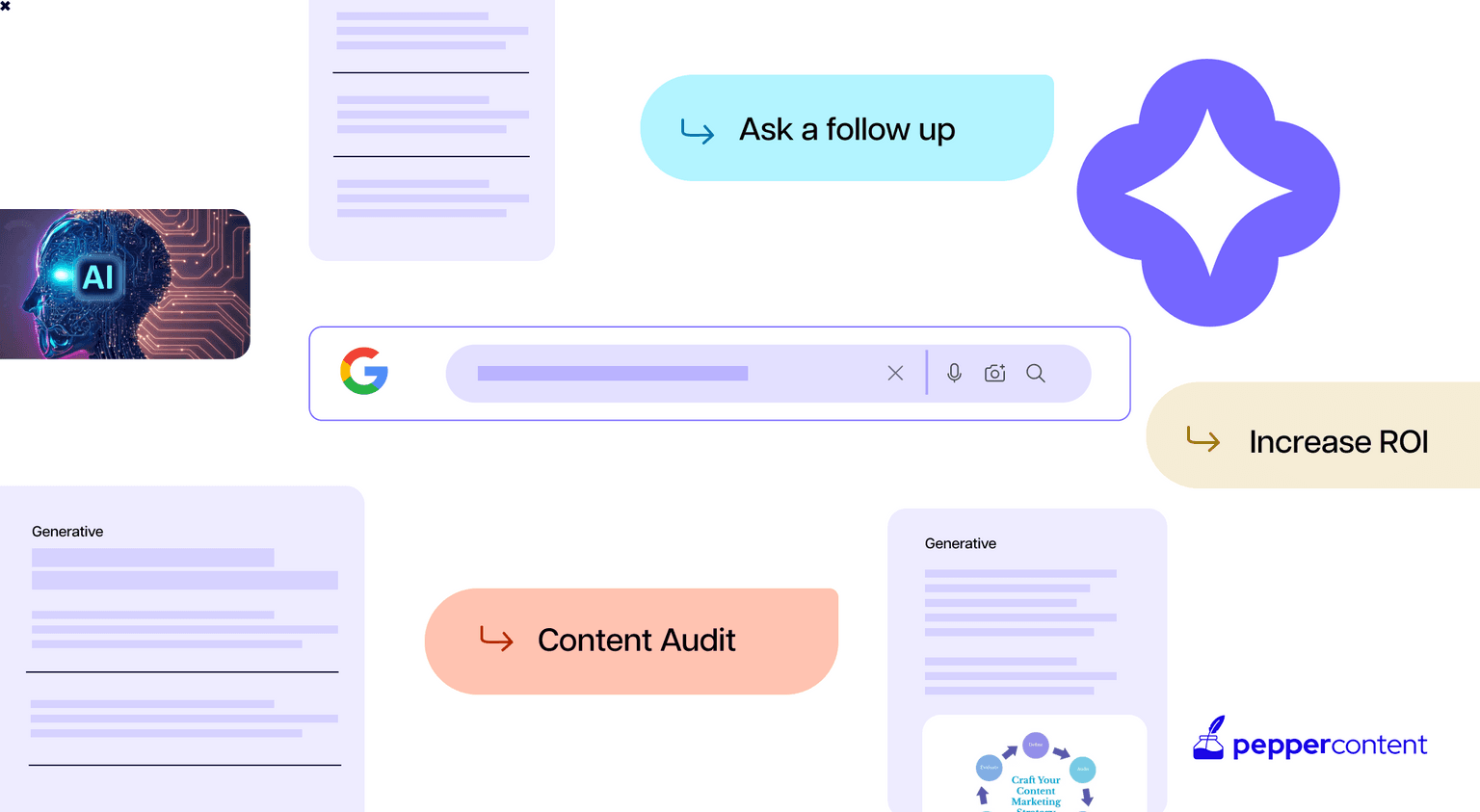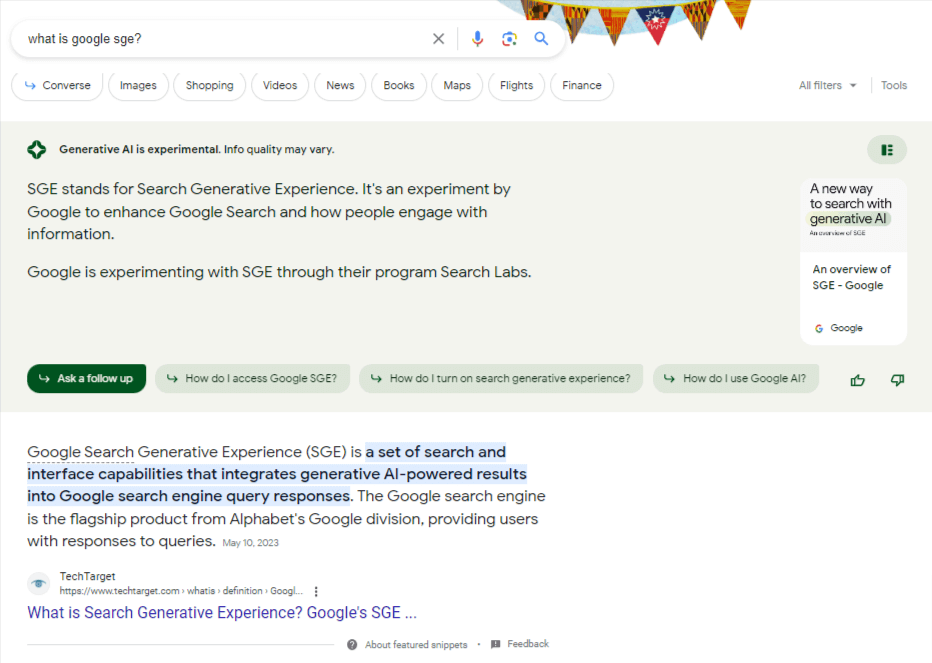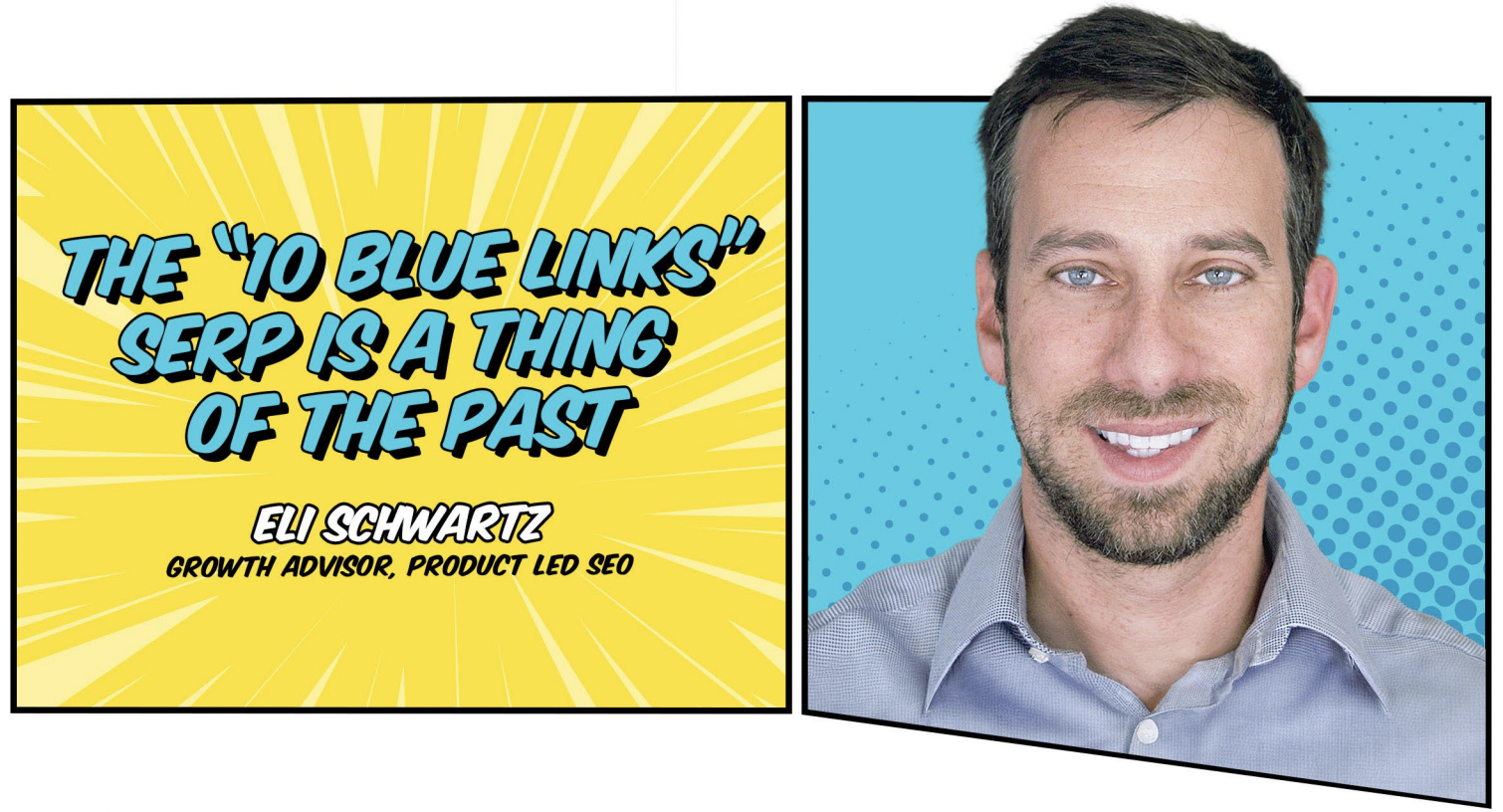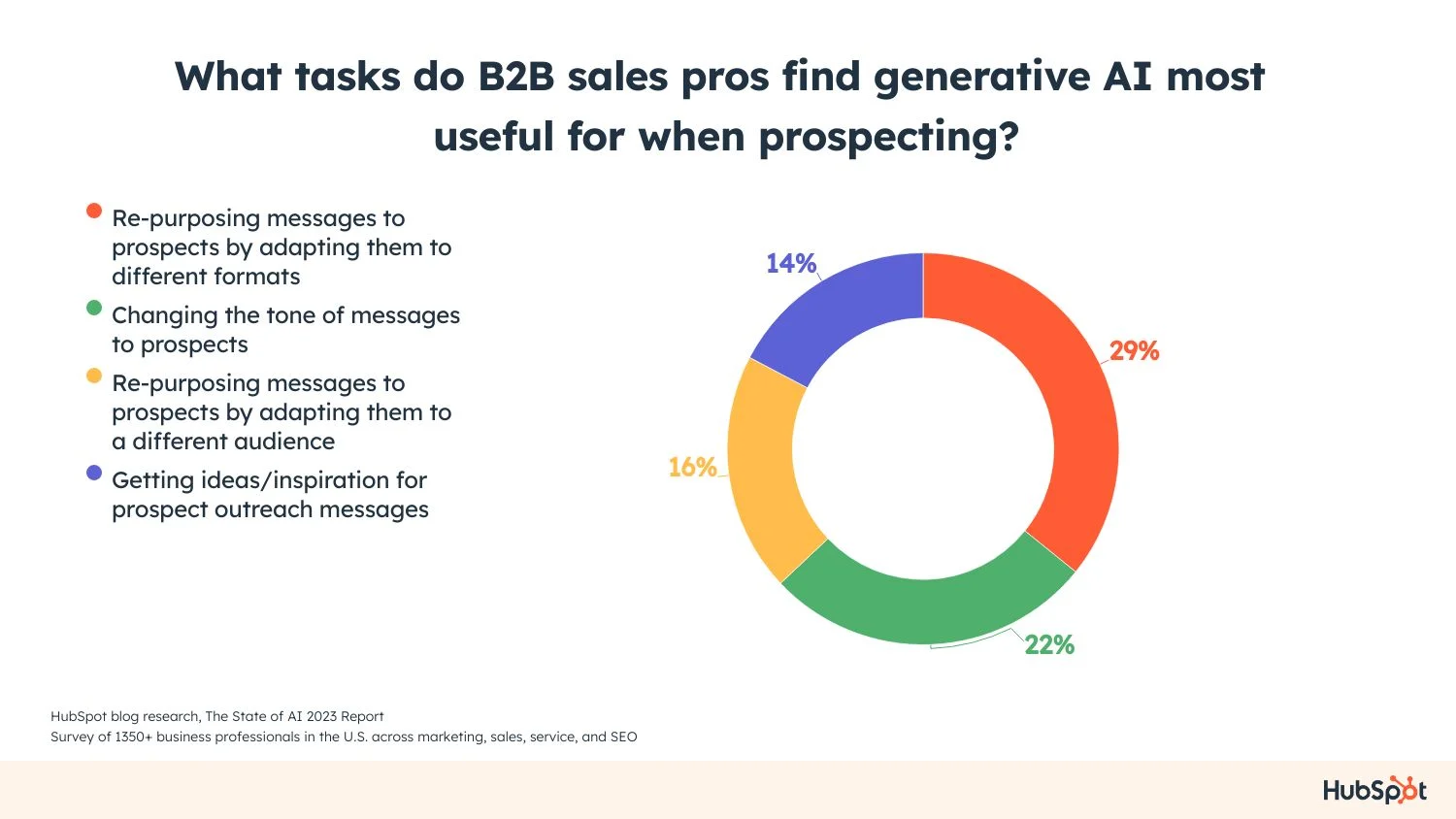What B2B Marketers Need to Know About Google’s AI Search Future

If you’re in the marketing space, it’s nearly impossible not to notice the buzz surrounding Google’s AI search engine experience (SGE). After Bing integrated with ChatGPT, the company is stepping up with its ‘Google AI Search Results.’ This initiative promises to revolutionize how B2B enterprises harness search traffic. The evolving landscape of artificial intelligence (AI) brings both golden opportunities and hurdles for companies aiming to enhance their digital footprint.
During a keynote speech in May 2023, Google offered a sneak peek into its vision of merging generative AI with search results, hinting at a shift from the conventional search experience. Consequently, enterprises need to recalibrate their B2B marketing strategies to excel in this new paradigm.
Marvin Chow, Google’s Vice President of Global Marketing, commented via Twitter:

“History shows that we will under-estimate the long-term possibilities but over-estimate the short-term impact. Regardless, all of our lives are about to go through a rapid evolution of change that will make things easier, make us smile, but also make us question our responsibility to society and our community.”
Google’s long-standing supremacy in the search area faces ripples of change with Bing’s AI-driven search debut. As the year unfolds and with search partnership agreements, including those with Apple and Samsung, this might be marked as the year when Google faces its most significant disruption since it rose to the top of the search hierarchy.
Google’s AI Search Innovations and B2B Marketing
Overview of Google’s AI Announcements
In January, Microsoft made waves in the tech world by introducing its GPT-4-integrated Bing search engine, sparking user interest. Unlike traditional search mechanisms that simply link to relevant websites, Bing’s innovative system dives deeper, understanding natural language to get direct answers by gathering data from various sources.
Google has consistently been at the forefront of integrating artificial intelligence (AI) into its products and services. However, this strategic move from Microsoft nudged Google out of its deliberate pace in adopting generative AI, a decision influenced by public pressure.
As a result, Google revealed its “Search Generative Experience” (SGE) powered by Google Bard during its Google I/O event in May. This revamped search platform leverages the potential of generative AI to provide users with in-depth search results.
Google positions this advancement as a “fresh approach to search queries, designed to streamline complex search tasks while also providing informative snapshots that link to more comprehensive resources.“
Here’s a comparative table outlining the key aspects of Google’s AI advancements against Bing’s GPT-4-powered search engine:

While Bing’s GPT-4-powered search engine offers notable advancements, Google’s AI innovations like SGE, Bard, and GeminiAI present a more holistic and integrated approach to B2B marketing.

The “Search Generative Experience” (SGE) represents Google’s effort to redefine the search landscape through advanced generative AI technology. It’s not just about fetching results but creating a conversational and intuitive interaction between users and the search platform, enhancing the B2B marketing capabilities by delivering more targeted results.
Similarly, Google Bard represents a groundbreaking shift by harnessing AI for content creation, offering B2B marketers a tool to craft compelling campaigns with minimal manual intervention.
As AI continues to reshape the digital landscape, businesses must leverage these innovations to stay ahead in the competitive market.
Implications for SEO Strategies
The integration of AI into search engines marks a dynamic shift in the digital landscape, significantly influencing traditional SEO tactics. Unlike conventional SEO practices focusing on keyword optimization, backlinking, and content quality, AI-driven search engines, such as Google’s SGE and Bing’s GPT-4, prioritize user intent, context, and personalized experiences.
Let’s take a look at the potential challenges that B2B marketers can expect with the integration of AI into the search engine:
- Algorithmic Complexity: AI-driven search engines employ complex algorithms that analyze user behavior, preferences, and context to deliver tailored results. This complexity poses challenges for B2B marketers, necessitating a deeper understanding of AI technologies, data analytics, and machine learning to optimize content effectively.
- Dynamic Ranking Factors: With AI, traditional ranking factors such as keywords and backlinks may become less deterministic. AI-driven algorithms consider various factors, including user engagement, content relevance, and in-depth understanding, making it challenging to highlight definitive SEO strategies.
- Content Personalization: AI-powered search engines prioritize personalized content experiences, requiring B2B marketers to craft highly targeted, contextually relevant content that resonates with specific audience segments. This shift demands a deeper approach to content creation, incorporating AI tools like Google Bard to generate tailored content at scale.

While AI integration in search engines introduces complexities for traditional SEO practices, it also presents unprecedented opportunities for B2B marketers:
- Prioritizing User-Centricity: The heart of AI-driven SEO is the user experience. B2B marketers can differentiate themselves by creating content and strategies that resonate, engage, and offer genuine value. This user-first approach not only boosts credibility but also establishes lasting relationships, driving long-term business growth.
- Gaining Deeper Insights with AI: AI tools, such as GeminiAI, offer B2B marketers invaluable insights into market dynamics, consumer behaviors, and emerging trends. By harnessing these insights, businesses can make informed decisions, refine targeting strategies, and uncover untapped opportunities, paving the way for strategic growth and innovation.
- Innovative Content Strategies: AI’s integration into SEO isn’t a curse but a catalyst for content innovation. B2B marketers can explore new content formats, delivery mechanisms, and channels. Whether it’s leveraging AI for content creation through tools like Google Bard or adopting AI-driven analytics for strategy refinement, the opportunities for innovation and growth are abundant.
Impact on SEM (Paid Search) Activities
The integration of AI into search engines is reshaping SEM, particularly paid search, making it crucial for B2B marketers to adapt.
With AI’s enhanced understanding of user context and intent, B2B marketers must refine their targeting strategies. Rather than relying solely on demographic or firmographic data, marketers should leverage AI-driven insights to target audiences based on their needs, preferences, and behaviors. This shift towards contextual targeting enhances ad relevancy, engagement, and conversion rates, maximizing ROI.
AI-driven analytics tools offer B2B marketers unparalleled insights into ad performance metrics, user behaviors, and campaign effectiveness. Marketers should leverage these analytics to monitor campaign performance, identify optimization opportunities, and refine SEM strategies in real time, ensuring maximum ROI and sustained competitiveness in the digital landscape.
Additionally, diversifying ad efforts across multiple platforms is essential to mitigate risks and expand reach. With the potential impact of AI-generated content on click rates, marketers should leverage automated bidding algorithms like smart bidding — to optimize volume and efficiency for their client campaigns.
One thing we can all be sure of is that by remaining informed and adaptable, marketers position themselves favorably to navigate the ever-changing SEM landscape effectively.
According to SEJ, Aleyda Solis, Founder and International SEO Consultant at Orainti said, “AI will change the types of content we invest in.” She emphasized on a potential shift towards investment in expert-led content and changes in the click behavior of users.
Practical Steps for B2B Marketers
For businesses, Google’s latest announcement carries implications beyond just its platform dynamics, signaling a transformative shift in the overall AI landscape. Given the significant influence of this tech titan, it’s evident that AI tools are here to stay.
While navigating this new shift might seem overwhelming, adopting a strategic approach will enable marketers to prepare for changes and maintain a competitive edge. Here are three key areas for consideration:
1. Embracing the Future of Search
With the huge volume of data, summarizing keyword performance will become complex. A strategic response involves categorizing keywords by topics, user intent, and the buyer’s journey.
Employing automation and natural language processing (NLP) technologies like OpenAI can help marketers to amplify their reach efficiently.
While Google offers insights on AI-driven content creation for areas like copywriting, briefs, and metadata, striking a balance is essential. That means ensuring a rigorous quality check on AI-generated content, eliminating misinformation, and evaluating your tech stack’s readiness to determine if you can use the APIs effectively.
2. Focusing on New Content Topics
Generative AI models are trained on existing textual data, which opens new doors to venture into new fields of interest yet to be fully explored by search engines.
Proactively creating content around emerging themes can position businesses as an authority in those areas, reaping the rewards in search rankings, credibility, and audience engagement.
3. Preparing for the Evolving AI and Search Landscape
The AI and generative text search are still in their early stages of development. To navigate this shift successfully, it’s only smart to partner with an expert SEO team that ensures businesses remain abreast of AI advancements and help build strategies tailored to the dynamic search landscape.
In times like these, agility, adaptability, and strategic recalibration emerge as indispensable assets for businesses poised for sustained success.
Generative AI Tools for B2B Marketers
Generative AI tools are revolutionizing the B2B marketing landscape by offering advanced capabilities in content creation, customer engagement, and predictive analytics. In fact, a Market.us report estimates that the generative AI market, especially in the marketing sector, will grow from $1.9 billion in 2022 to $22.1 billion by 2032.
Having said that, let’s take a look at the various generative AI tools set to reshape the B2B marketing landscape:
- OpenAI’s Generative Pre-trained Transformers (GPT) series, including models like GPT-3 and GPT-4, are renowned for their ability to generate human-like text. B2B marketers leverage these tools for automating content creation, drafting compelling product descriptions, crafting personalized emails, and generating social media content that resonates with target audiences. ChatGPT focuses on conversation intelligence. It enables B2B marketers to automate customer interactions, offer real-time support, and gather insights from user conversations, enhancing customer experience and engagement.
- Drift is a conversational marketing platform that utilizes AI to enhance customer interactions. It offers chatbots, virtual assistants, and analytics tools, enabling B2B marketers to automate lead qualification, offer personalized experiences, and optimize conversion rates.
- Jasper.ai is an AI writing tool primarily designed for generating marketing copy, including blog posts, product descriptions, company bios, ad copy, and social media captions. It offers numerous templates and features like text and image AI generation, integration with Grammarly, revision history, auto-save, document sharing, multi-user login, plagiarism checker, and brand voice customization.
The Future of AI in B2B Marketing
Businesses poised to adapt alongside AI’s continued evolution will be the ones to capitalize on its advancements and reap the rewards.
At the core of this transformation is the use of generative AI tools like OpenAI’s GPT series. These tools empower B2B marketers to create tailored content that resonates with specific audiences. By automating content creation processes and enhancing engagement strategies, generative AI enables businesses to connect more effectively with their target customers, driving improved conversion rates and fostering loyalty.
Moving beyond content, AI’s influence extends deeply into lead generation and prospecting. Advanced AI tools leverage predictive analytics to sift through vast datasets, identifying potential customers with precision. These AI-driven solutions optimize outreach efforts by prioritizing leads based on their conversion potential, ensuring marketers engage with prospects most likely to convert.
When it comes to prospecting, AI-driven platforms simplify and elevate the engagement process. Features like sentiment analysis and automated chatbots enable personalized interactions, allowing businesses to nurture relationships, promptly address customer queries, and enhance overall engagement. Hubspot found:

The integration of AI into marketing analytics brings forth a new era of data-driven decision-making. By identifying key performance indicators, evaluating campaign effectiveness, and refining strategies based on data-driven insights, AI-powered analytics tools empower B2B marketers to allocate resources carefully, optimize marketing initiatives, and achieve measurable growth in competitive markets.
Wrapping Up
It’s evident that the application of AI in B2B content marketing is here to stay. By using today’s technology smartly and strategically planning for further advancements, businesses can cement their leadership position in a rapidly evolving marketplace.
Looking for high-quality and well-optimized content? Don’t forget to check out Pepper Content’s expert-led writing services.
Latest Blogs
Learn how to rank on AI search engines like ChatGPT, Perplexity, and Gemini by optimizing your content for authority, structure, and relevance. Stay ahead in AI-driven search with this strategic guide.
Explore the best healthcare SEO services for your medical practice. Improve online visibility and effectively reach more patients in need of your services.
Discover top social media agencies specializing in banking solutions, enhancing financial services and driving engagement.
Get your hands on the latest news!
Similar Posts

Generative AI
8 mins read
Top 5 Rules to Rule AI Marketing Tools Like a Pro

Generative AI
8 mins read
ChatGPT vs Grok AI vs Gemini AI: Everything You Need to Know About These Powerful AI Assistants

Generative AI
7 mins read